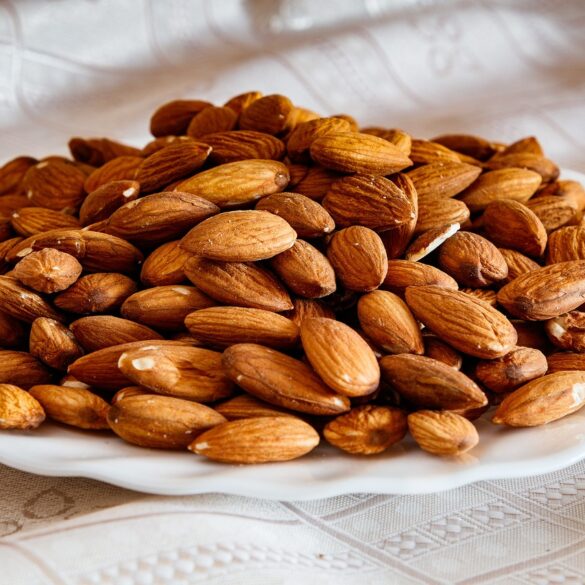Peanuts Vs Almonds: Which nut is more Nutritious?
Peanuts and almonds are two of the most popular and widely consumed nuts in the world. They are not only delicious but also packed with essential nutrients that promote good health. While both peanuts and almonds offer numerous health benefits, many people wonder which nut is more nutritious.
In this article, we will delve deep into the nutritional profiles of peanuts and almonds, explore their respective health benefits, compare their nutritional value, and discuss considerations for allergies and digestive health. By the end, you will have a better understanding of these nuts, enabling you to choose the one that best suits your nutritional needs and preferences.
1. Introduction: Comparing Peanuts and Almonds
Understanding the popularity and nutritional value of peanuts and almonds
When it comes to nuts, peanuts and almonds are two favorites that have earned their place in snack time stardom. While peanuts and almonds both bring a satisfying crunch and nutty flavor to the table, you may be wondering which one packs a more nutritious punch. Let's dive into the nutritional profiles of these two nuts to find out which one comes out on top.
2. Nutritional Profile of Peanuts
The macronutrients in peanuts
Essential vitamins and minerals found in peanuts
Peanuts, despite their name, are not actually a nut – they're a legume. But don't let that fool you, they still boast an impressive nutritional profile. Peanuts are a great source of protein, healthy fats, and dietary fiber, making them an excellent choice for a satisfying snack. They also contain important vitamins and minerals such as vitamin E, niacin, folate, and magnesium, all of which play a crucial role in maintaining overall health.
3. Nutritional Profile of Almonds
The macronutrients in almonds
Essential vitamins and minerals found in almonds
Almonds, on the other hand, are bona fide tree nuts and they have their own set of nutritional benefits. Similarly to peanuts, almonds are rich in protein, healthy fats, and dietary fiber. They also provide essential vitamins and minerals like vitamin E, riboflavin, magnesium, and calcium.
4. Health Benefits of Peanuts
Lowering the risk of heart disease and cholesterol levels
Promoting healthy brain function and cognition
Now that we know the nutritional profiles of peanuts and almonds, let's explore some of the specific health benefits that peanuts bring to the table. Studies have shown that regularly consuming peanuts can help reduce the risk of heart disease and lower cholesterol levels. They are also rich in antioxidants that support brain health and cognition. So, don't underestimate the power of the humble peanut!
Whether you're a fan of peanuts or almonds, both of these nuts offer nutritional value and health benefits. So go ahead and enjoy them in moderation as part of a balanced diet. After all, life's too short to be nutty about small things – unless we're talking about peanuts and almonds!
5. Health Benefits of Almonds
Almonds are not just delicious, but they also offer a range of health benefits. One of the standout advantages of almonds is their ability to support heart health and improve cardiovascular function. Packed with healthy monounsaturated fats, almonds can help lower bad cholesterol levels and reduce the risk of heart disease. So, go ahead and sprinkle some almonds on your morning oatmeal or enjoy them as a snack to give your heart some love.
Another fantastic benefit of almonds is their ability to enhance bone strength and prevent osteoporosis. These little nuts are a great source of calcium, which is essential for maintaining healthy bones. Additionally, almonds contain magnesium, phosphorus, and vitamin E, all of which contribute to strong and healthy bones. So, grab a handful of almonds and snack your way to better bone health.
6. Comparing Nutritional Value: Peanuts vs Almonds
When it comes to comparing the nutritional value of peanuts and almonds, there are a few key factors to consider.
Firstly, let's talk about protein content. While both peanuts and almonds are good sources of protein, almonds take the lead here. They contain slightly more protein per serving and also have a more desirable amino acid profile, offering a wider range of essential amino acids.
Moving on to fat content, both nuts are relatively high in fat, but it's the types of fats present that differentiate them. Peanuts contain more saturated fat, while almonds are rich in monounsaturated fats that are considered heart-healthy. So, if you're watching your saturated fat intake, almonds might be the better choice.
When it comes to fiber and carbohydrate content, almonds again take the prize. They contain more fiber and fewer carbohydrates compared to peanuts. This makes almonds a great option for those looking to add more fiber to their diet or following a low-carb eating plan.
7. Considerations for Allergies and Digestive Health
It's important to consider allergies and digestive health when choosing between peanuts and almonds.
Peanut allergies are quite common and can be severe, even life-threatening for some individuals. If you or someone you know has a peanut allergy, it's crucial to avoid peanuts and any products containing peanuts altogether.
On the other hand, while almonds are generally safe for most people, some may experience digestive issues due to their high fiber content. Consuming large quantities of almonds or eating them too quickly can lead to bloating, gas, or even diarrhea. So, moderation is key, especially if you have a sensitive digestive system.
8. Conclusion: Choosing the Nut that Best Suits Your Needs
In the battle of peanuts vs almonds, both nuts offer their own unique set of benefits. Almonds are the clear winner when it comes to heart health, bone strength, protein content, and fiber. However, if you have a peanut allergy, peanuts are obviously a no-go.
Ultimately, the choice between peanuts and almonds boils down to personal preference and dietary needs. So, go ahead and grab the nut that best suits your taste buds and nutritional goals. Whether it's the satisfying crunch of peanuts or the creamy goodness of almonds, enjoy them in moderation and reap the benefits of these nutrient-packed nuts.
In conclusion, both peanuts and almonds are highly nutritious nuts that offer a range of health benefits. Peanuts are rich in protein, vitamins, and minerals, making them beneficial for heart health and brain function. On the other hand, almonds are packed with healthy fats, fiber, and antioxidants, supporting cardiovascular health and bone strength.
Ultimately, the choice between peanuts and almonds depends on your personal preferences, dietary needs, and any allergies or digestive considerations you may have. Incorporating either of these nuts into your diet can be a delightful and nutritious addition. So, go ahead and enjoy the goodness of peanuts or almonds, knowing that you are making a healthy choice for your overall well-being.
FAQ
1. Can peanuts and almonds be part of a healthy diet?
Yes, both peanuts and almonds can be excellent additions to a healthy diet. They are nutrient-dense and offer a variety of vitamins, minerals, and beneficial compounds. However, it is important to consume them in moderation as part of a balanced eating plan.
2. Are peanuts and almonds suitable for individuals with nut allergies?
While peanuts and almonds are both classified as nuts, they belong to different botanical families. However, it is crucial to note that peanut allergies are relatively common, and individuals with a peanut allergy should avoid peanuts and products containing peanuts. Almond allergies are less prevalent but still possible. It is best for individuals with nut allergies to consult with a healthcare professional before incorporating peanuts or almonds into their diet.
3. Can peanuts and almonds aid in weight loss?
Both peanuts and almonds can be beneficial for weight loss due to their high protein, fiber, and healthy fat content. These nutrients help promote satiety and can help control appetite. However, portion control is important as nuts are energy-dense, so it is recommended to consume them in moderation as part of a calorie-controlled diet.
4. Are roasted or raw peanuts and almonds healthier?
Both roasted and raw peanuts and almonds have their own set of benefits. Roasting can enhance the flavor and crunchiness of nuts, but it may slightly reduce the levels of certain heat-sensitive nutrients. Raw nuts, on the other hand, retain more of their natural nutrients. Ultimately, the choice between roasted and raw nuts comes down to personal preference, as both can be enjoyed as part of a healthy diet.




